Giants in the Association
When we first returned to Canada, it was widely believed that we were losers, which, in a sense we were. Our back pay which had accumulated while we were in custody of the Japanese was given to us, but nothing much in the way of special treatment was offered.
But those men who gave of themselves to get recognition for their Hong Kong
comrades must be acknowledged for their efforts.
I must confess that in the early days after the war, I was scrambling to get an
education, and didn't have contact with many Hong Kong Veterans.
I therefore did not contribute to the establishment of the Hong Kong Veterans Association, and it was only in later years that I became actively involved.
At this point I should name those who spent countless hours of their leisure time and money out of their own pockets to create an organization to help needy Hong Kong Veterans.
I will risk omitting some important names of those who went before, men who had the foresight to create an organization dedicated to the welfare of Hong Kong Veterans. By naming the more recent ones here, I hope I do not offend anyone.
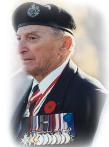 H. Clifford Chadderton, CC, O.Ont.,OStJ,CLJ,CAE,DCL, LLD
H. Clifford Chadderton, CC, O.Ont.,OStJ,CLJ,CAE,DCL, LLD
I have to start with Cliff Chadderton, who, although he is not a Hong Kong Vet, is one of the best friends we have ever had.
Cliff is CEO of the War Amps of Canada, Chairman of the National Council of Veterans Associations, of which, including the Hong Kong Veterans Association, there are some forty-five associations.
Cliff lost a leg in the invasion of Europe, and has been limping around on an artificial one ever since. He is in his eighties now, like many of us, but he keeps going. He is involved in more things than many men half his age.
Cliff is Patron of the Hong Kong Veterans Association, and also Patron of the Hong Kong Veterans Commemorative Association. He willingly joins us at our reunions or at any function that he believes will be of assistance to us.
When all seemed lost in the struggle to wrest pay for slave labour from the hands of the Japanese government, after we had been sold down the river by the Government of Canada in1952, Cliff never gave up in his battle for settlement of our claim, finally convincing Ottawa to settle.
Cliff and his efficient and sympathetic staff at WAR amps, also obtained for every Hong Kong Vet, attendance allowance and exceptional incapacity allowance. We are extremely grateful
 Roger Cyr
Roger Cyr
Roger aided his Hong Kong Comrades in many ways in his years of service. He held many offices, from President of the Quebec Maritime Branch, to Secretary of the National Council and finally as President of the National Council of the Hong Kong Veterans Association.
His leadership, his dedication to his comrades will be remembered as long as there is a Hong Kong Veteran alive.
Roger's part in achieving settlement of the claim for slave labour is only one of his efforts for which we should be grateful.
One had to admire his ease of expressing himself in French and in English, and his mastery of both languages served him well, in his chosen vocation as well as in his untiring efforts on behalf of his fellow Hong Kong Veterans.
I am proud to say that I knew Roger from the time we were children in the small town where we grew up. For both of us, joining the Royal Rifles was our first venture into the big world.
He died in 2001 after a courageous fight against cancer for many years, undergoing surgery and treatment after treatment for the dread disease.
 Harry Atkinson
Harry Atkinson
Harry was one of the most dedicated of the National Presidents. Although we owe huge debts of gratitude to Sam Kravenchuk, Everett Denison, Charlie Bradie, Ken Gaudin , Don Nelson, Wally Gray, and many others, Harry did more than his share in his service to his comrades.
I have many happy memories of Harry. Two trips to Hong Kong and Japan (not counting the one in 1941!) several meetings with Veterans Affairs officials in Charlottetown, a winter in Victoria, and many social outings, cooking steaks and lobsters.
Harry was twice National President, a position he held when he died in Winnipeg in March, 2002.
As service officer for the HKVA, he travelled the length and breadth of Canada to help and comfort those of his comrades who needed advice in dealing with pension and health problems.
He was obsessed with the determination to get one hundred percent pension for all Hong Kong Veterans. It was touching to see him sitting in the back row of an assembly in Winnipeg when a VAC official announced the good news. Although it was largely through his efforts that success was achieved, he didn't want to take the credit.
Harry died of lung cancer. A week before he died, he spoke to me from his hospital bed. As first vice-president, it was my duty to step into his shoes. I said,"Harry, I'll do my best." He said, "Do your best, and if you need help, let me know." I'll never forget it.
Lieut. Angus MacMillan
In my view, Angus MacMillan was one of the best officers in the Royal Rifles. He came to the Regiment when "A" and "D" Companies were in Botwood, Newfoundland.
He was placed in charge of 18R Platoon, and although he was new to the ruffians in "D" Company he soon earned our respect.
I had the opportunity of observing him in action, and his fearless leadership left no doubt in my mind that he was well qualified for the role in which he served.
I associated briefly on a professional basis with Angus after the war, when he was a teacher at the Quebec High School, a position he held until his retirement.
After his wife died, Angus moved to Surrey, BC. He suffered a tragic death, being struck by a car while crossing the street in his wheel chair.
Lieut. Elmer Denison
Elmer Denison had been my Grade VIII teacher, and it was huge surprise to me to meet him as my platoon officer in July, 1940.
Lieut. Denison was well liked by the tough guys in 17 Platoon. He was good to us, giving us many a break, sometimes undeserved. He earned the nickname, "Mother Denison", although he was never called that to his face. If he should read this it will probably be the first time that he has ever heard of the unique place he held in the hearts of his men.
Elmer is still with us. I have heard of him just today, March 4, 2004, when he sent us a donation to the museum we are building in New Richmond. Memory of him is one of the treasures of this Hong Kong Veteran.
Elmer's brother Capt. Everett died a few years ago.
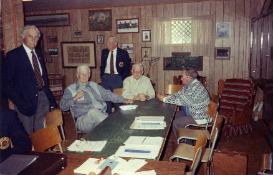 Here we have a group at an annual reunion in New Richmond, probably in 1986.Left
to right: Joe Bujold, Phil Lawlis, Arnold Ross, Pat Poirier, and Charlie
Campbell.
Here we have a group at an annual reunion in New Richmond, probably in 1986.Left
to right: Joe Bujold, Phil Lawlis, Arnold Ross, Pat Poirier, and Charlie
Campbell.
For many years Joe was a member of the Executive of the Quebec-Maritimes Branch. Arnold was first vice-president for years and up until the time we turned things over to the Commemorative Association. They both held the Award of Merit.
Phil, Pat, and Charlie, were regular attendees at all functions, and always
contributed to the smooth operation of the reunions. Joe and Charlie are gone
now.
Colonel Jack Price
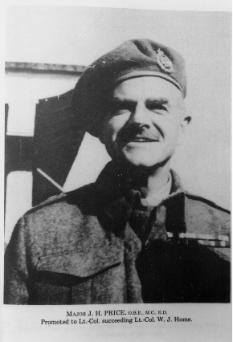 J.H. Price, O.B.E, M.C. E.D. was second-in-command of the Royal Rifles until
the death of Brigadier Lawson, when Col. Home, our O/C was promoted to command
the Canadian contingent. Major Price was then elevated to the rank of Lieutenant
Colonel, and assumed command of the Royal Rifles.
J.H. Price, O.B.E, M.C. E.D. was second-in-command of the Royal Rifles until
the death of Brigadier Lawson, when Col. Home, our O/C was promoted to command
the Canadian contingent. Major Price was then elevated to the rank of Lieutenant
Colonel, and assumed command of the Royal Rifles.
Col. Jack Price was arguably
the best-loved officer in the Regiment. There was not a man who would not follow
him wherever he led.He and Mrs. Price joyfully attended many of our reunions,
where he was always the star attraction. He called us "My boys".
Lawrence Rattie
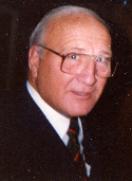 Lawrence was loved and respected by all who knew him. His dedication to his Hong
Kong Comrades never wavered.
Lawrence was loved and respected by all who knew him. His dedication to his Hong
Kong Comrades never wavered.
He held a number of offices in the Branch, including a stint as president. His lifelong dedication and strong leadership were the guiding light and provided continuity through thick and thin.
He died after a long and difficult struggle with cancer. Although he suffered
intense pain, he never complained, always displaying a cheerful attitude.
Joe Bujold
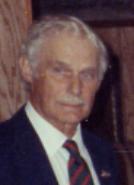 Joe worked in Montreal most of his life after leaving the army. He also had a
house in Escuminac where he and Rita used to spend the summers, and then as a
permanent home after retirement.
Joe worked in Montreal most of his life after leaving the army. He also had a
house in Escuminac where he and Rita used to spend the summers, and then as a
permanent home after retirement.
Joe was a director of the Quebec-Maritimes Branch for many years, and he faithfully attended every meeting.
At our reunions he was always a member of the Colour Party, and his erect and
soldierly bearing lent dignity and respect to the Ceremony. Joe died in 1997.
There is a destiny that makes us brothers
No one goes his way alone
All that we
send into the lives of others
Comes back into our own.
Edwin Markham
These lines by Edwin Markham apply to the Hong Kong Veterans in a very special way. To us, comradeship was most important.
A buddy in need, having difficulty in the long march to the work site, or needing a soothing drag from that last cigarette, was helped and comforted by his friends.
When Hong Kong Veterans meet, we unabashedly greet each other with joy and affection that others may find difficult to understand. It is the memory of the deprivation we endured, that ties us together in a bond stronger than blood. As each Vet dies, the ones who are left feel a loss as deep as the loss of a close relative. We mean it when we say, "We will remember them."
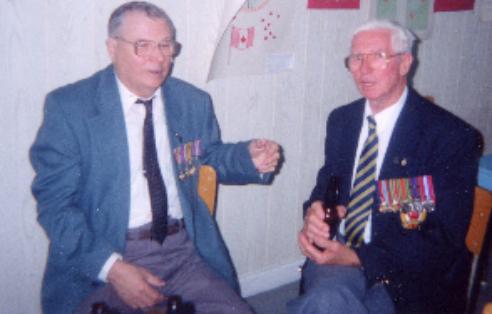 Raymond Murray and Leo Murphy
Raymond Murray and Leo Murphy
Ray and Leo were in 16 Platoon. Ray was a determined and intense guy. He was
good at arm wrestling, and once bested CSM Kirouac's champion, a huge fellow
from "A" Company. Leo had a keen sense of humour. He often kept us amused with
his stories, most of which, I suspect, were figments of his fertile imagination.
 Raymond Quirion
Raymond Quirion
Raymond was also in 16 Platoon in "D" Company. He lives in Montreal and in the
summer owns and operates an art studio in the tourist town of Perce. There he
displays many of his own paintings.
 Reggie Law
Reggie Law
Reggie is one of the stalwarts of the Association. For many years Reg has looked
after the needs of HK Vets and widows in the Campbellton area. In 2002 he was
awarded the Queen's Golden Jubilee Medal.
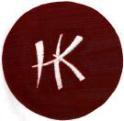 Hong Kong Badge
Hong Kong Badge
This is the shoulder badge we were issued with on our return to Canada. I don't know who designed it, but it has become a unique symbol of the Hong Kong Veteran.
We were also given a Hong Kong lapel button, which is highly prized by all who received it.
While browsing through a store in Hong Kong in 1994,I came across these badges
on sale for $75 HK each.
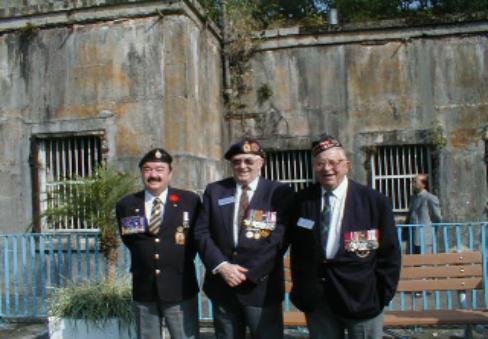 Bill Barclay, myself, Smoky Smith, VC
Bill Barclay, myself, Smoky Smith, VC
Smoky needs no introduction. I am particularly proud to have been photographed with him. Bill Barclay, who accompanied us to Hong Kong in 2000, was at that time Dominion President of the Royal Canadian Legion. He died in office.
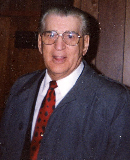 Raoul Tremblay
Raoul Tremblay
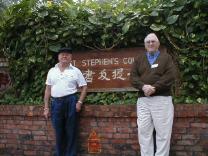 Flash Clayton and Phil
Flash Clayton and Phil
This was taken in 2000 in front of the sign of St, Stephen's College where the Christmas Day massacre took place. Flash was in the emergency hospital at the time because of wounds sustained earlier and narrowly escaped being killed.
This picture was taken just after a moving experience on the steps of the College in which Al Babin and Flash recounted the story of the massacre.
The massacre was one of the most horrific episodes in the whole invasion of the Colony. I lost good friends who were killed at St. Stephens, among them, Bill Fallow and Euclid Cyr.
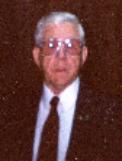 Pat Poirier
Pat Poirier
Pat lives in Montreal and is a regular at all our reunions. Pat played in the Regimental band and was also a nurse. He has written an account of his experiences.
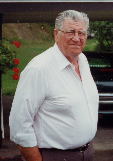 Henry Lyons
Henry Lyons
Henry was a member of 17 Platoon. He and I were together throughout prison camp.and still see each other often.
Henry served as Regional Director of the Q-M Branch for many years.
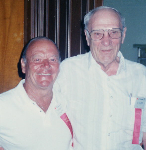 Flash and Ossie
Flash and Ossie
Flash and Ossie were both sergeants in the RRC.Flash and wife Jessie have always been faithful attendees at our reunions. Flash always acts as parade marshall, a time when his happy manner and story telling are put aside and he demands strict discipline and respectful attention to the parade and the cenotaph ceremony.He has influenced some beneficial changes in the Hong Kong Veterans Association.
Ossie Clark is an old friend from days when we both worked in Sept-Iles. Since
then we have carried on the friendship through the Quebec-Maritimes Branch where
he has held many offices up to first vice-president.
Ossie has worked untiringly for the welfare of his Hong Kong Comrades. If he isn't running a raffle, he has some other scheme going to raise funds to help those in need.
He has held many positions in the Royal Canadian Legion and is one of the main supporters of the Lennoxville Branch of the Army, Navy, and Air Force Association.
In My Mind's Eye
There are a thousand other pictures of comrades who shared those evil days from December, 1941 to August 1945. Those cherished pictures exist for me only in my memory. They will be there as long as I live.
Ed Rodrigues was from St. Kitts Island in the Caribbean. I remember the long walks we used to take up and down the main road in ShamShuiPo.
Tommy Thompson was from Shoal Lake, Manitoba. We became friends while we were
patient/orderlies in the hospital in ShamShuiPo.
Joe and Jim Furey were from Manitoba. Joe died in Japan, Jim survived and
returned to Canada. He died several years ago.
Omar Runnels. We called him "The Greek". Why, I don't know. He was a unique character. Laughing with him helped to pass many hours.
Glyn Chipping was also a patient in the hospital. Associating with him helped to influence me to return to school after liberation. I still see him now and then at reunions in Winnipeg.
Bert Woodman also spent the years of imprisonment in ShamShuiPo. He had been wounded at Repulse Bay and bore the scar on the back of his neck the rest of his life. In the POW camp he used to sharpen blades for Dr. Ashton-Rose for performing operations.
Most of these friends have long since gone to their individual rewards. Whatever that may be, " We will remember them."
Ralston
Joseph Ralston Hardy died on April 8, 1994. He was my boyhood chum, schoolmate, and comrade-in-arms.
I can't remember when we first met. We were probably just out of diapers. We lived about a quarter of a mile apart, he at the end of a long lane and I at the other.
In our childhood days, there were few artificial amusements to be had, so we had to invent our own. We did what I suppose most kids did in those days.
We rolled hoops with a stick, we made carts out of whatever materials could be found, we swam in the waters of the Baie des Chaleurs, we made tree houses, we carved wooden soldiers out of cedar shingles, coloured them blue and red with wax crayons, and killed each other's armies with long-range artillery, powered by rubber bands.
At school we got the strap for calling the teacher a screech-owl when we thought she couldn't hear us. We listened enchanted to ghost stories at a neighbour's house and then were too scared to go home in the dark.
We played shinny in the backyard rink, often as not with a wooden puck, and sometimes with a frozen horse-ball.
When we grew a little older we played a more organized type of hockey, he in the goal and I somewhere out front. From the first he was a fearless goalie, and after the war he graduated to the senior team where he proved his ability again and again.
When the war came along we were both a little young, but the end of 1940 saw us both in the Royal Rifles of Canada.
Ralston spent much of his captivity working in the dockyards in Japan, and after the war he returned home, scarred like all of us by the years of deprivation.
Each of us dies a little with the passing of one of our Hong Kong buddies, and for Ralston the sentiment for me was keenly felt.
Major Maurice Parker
Major Parker was the only company commander in the Royal Rifles who didn't have the benefit of battle experience, as did the others, who were all veterans of World War I.
I became closely attached to him because of my position as company clerk at my desk outside his office door.
Because of his kind and gentle nature, he was well regarded by the men of "D" Company. He called me "Philip".
One event will forever be in my mind. We were preparing to attack a Japanese-held position when he spotted me with my head bandaged.
Even in the excitement of the moment, his compassionate nature prompted him to turn to me and say,"Philip, are you all right?"
That is only one of the reasons that he has been held in my high esteem. That he would consider my well-being in a moment of high excitement is an example of his concern for his men.
I will not forget him. I am ever so grateful that I met him in Victoria before he died.
The End
Now I come to the end of this tale. I had for a long time hoped to put my story together in one form or another. After struggling with my conscience, delaying, postponing, agonizing over how to put my thoughts together -- finally, a solution!
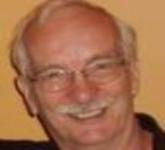 Ron Parker
Ron Parker
Out of the blue I received an e-mail from Ron Parker, son of Major Parker, who suggested that I have a look at a web site that he had set up for me.
Through the medium of the chat line, from Cancun, Mexico, he guided me through the process of building the site.
For months we chatted several times a day, and he led me virtually by the hand, adding text and pictures, and advising me as to form and format.
To Ron I owe the existence of this web site. Without his help it would not have
been possible. Arigato, Ron.